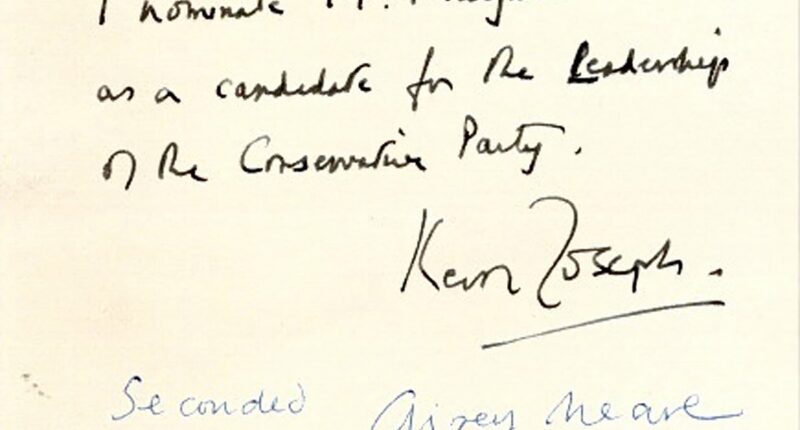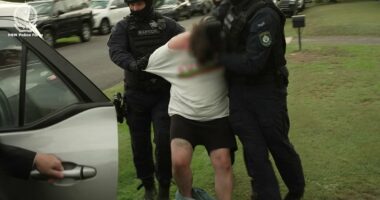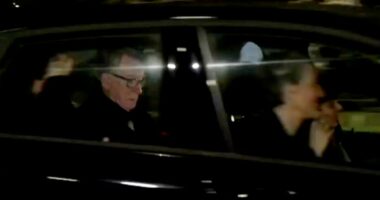Share this @internewscast.com
The nomination papers responsible for securing Margaret Thatcher’s unlikely leadership of the Conservative Party in 1975 were discovered in an old garage.
They belonged to Tory grandee Sir Edward du Cann, who was chairman of the party’s hugely influential 1922 Committee during the contest.
One of the papers, which is dated January 27, 1975, is written and signed by Mrs Thatcher’s key supporter Keith Joseph.
Another – dated a few days later – was penned by her campaign manager Airey Neave, who was murdered by the IRA in 1979.
Also part of this collection, which is up for auction with an estimated value of £100,000, is a document signed by Mrs. Thatcher that confirmed her win.
It shows how, in the second round, she received 146 votes from Tory colleagues – 67 more than nearest challenger Willie Whitelaw.
Outgoing leader and former prime minister Sir Edward Heath had resigned after getting fewer votes than Mrs Thatcher in the first ballot.
Mrs Thatcher had been considered a rank outsider when the contest began.

The nomination papers that clinched Margaret Thatcher’s leadership of the Conservative Party in 1975, despite the odds, were uncovered in a garage. Pictured: The one created by Keith Joseph, one of Thatcher’s prominent supporters

Margaret Thatcher outside Number 10 Downing Street on the day she became prime minister, 1979
Thatcher, who marks 100 years since her birth today, went on to secure the 1979 election victory and was re-elected twice, serving as Britain’s first female prime minister for more than 11 years.
She had served as education secretary under Heath from 1970 until the 1974 election, when Labour’s Harold Wilson triumphed.
Sir Edward never forgave Mrs Thatcher for standing against him. When she was forced to resign in 1990 he declared, ‘rejoice, rejoice, rejoice’.
On the slips signed by Joseph and Neave, Mrs Thatcher signed her name and wrote: ‘I consent to be nominated’.
Joseph’s nomination was seconded by Neave, whilst the latter’s was backed up by fellow Tory Sir Bill Shelton.
Joseph was anticipated to enter the leadership contest, but his support waned sharply following controversial remarks about poor women having too many children.
He went on to serve as industry secretary and then education secretary under Mrs Thatcher.
Also in the sale is a letter to du Cann the month before Thatcher agreed to be nominated, imploring him to stand.

Another – dated a few days later – was penned by her campaign manager Airey Neave, who was murdered by the IRA in 1979

Included in the collection, anticipated to fetch £100,000 at auction, is a document bearing Mrs. Thatcher’s signature which confirmed her victory in the leadership contest
Signed by some of the party’s big beasts, it stated: ‘For some time it has been increasingly obvious to a number of us that you have the qualities which are required in a new Leader: your warmth, your ability to present our case forcefully and sympathetically, your skill as Chairman, and, above all, the affection in which you are held by your colleagues, make it essential, as we see it, that you should offer yourself for the Leadership of our Party. Indeed, we consider it is your duty to do so.’
But du Cann would not change his mind and within weeks the 49-year-old Thatcher headed to the first round of voting.
The documents, found recently, are to be offered for sale at Duke’s of Dorchester on January 29th next year.
Other treasures from the archive include notes and records from du Cann, as well as correspondence relating to the leadership election with people including Heath and the then Labour PM Harold Wilson.
Guy Schwinge of art consultants Hanover Forbes said: ‘It is 100 years since her birth and 50 since she became leader of the Conservative party.
‘The cache contains the signed nominations of all candidates in both ballots for the party leadership.
‘Leading American institutions, such as the Ronald Reagan Presidential Library, are expected to keep a close eye on the sale but will need an export licence to take the archive out of the country.
‘The files and documents were discovered in a garage in Somerset.’
Du Cann, who died in 2017, was an MP from 1956 to 1987, served as party chairman from 1965 to 1967 and chaired the 1922 committee from 1972 to 1984.
Heath had remained as Tory leader after losing the 1974 election but MPs then turned against him.
Because he was chairman of the 1922 Committee, du Cann played a pivotal role in the machinations that led to a leadership contest.
One meeting of the 1922’s executive committee took place in Milk Street. The location prompted the nickname of the ‘Milk Street Mafia’ for the plotters.
Mrs Thatcher won the 1975 contest despite being considered a rank outsider when it began.
















